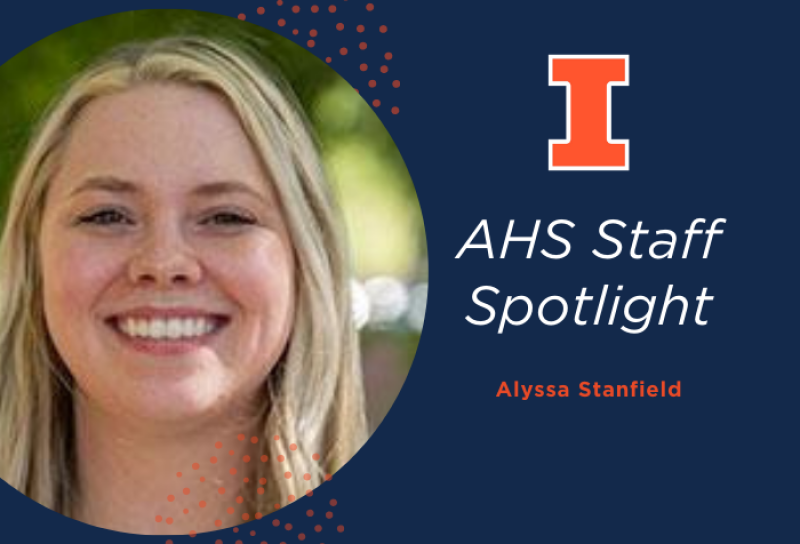
Staff Spotlight: Alyssa Stanfield
The College of Applied Health Sciences has an array of faculty that are renowned in their areas of research and instruction. But AHS would not be able to operate as efficiently without its staff, who are the backbone of this great college. Periodically, we will shine the light on one of these staffers so their colleagues can get to know them better. This time, it's Alyssa Stanfield, the new assistant director of the Center for Health, Aging, and Disability (CHAD).
Q: Where are you from?
A: I grew up in East Central Illinois, and now I live in Tuscola, Ill.
Q: What did you study?
A: I have a bachelor’s degree in Community Health Promotion from Illinois State University
Q: What brought you to the University of Illinois?
A: I grew up on this campus; my mother, grandmother, and uncle all worked, or still work here. I saw such a great experience from all of them, I knew this is where I wanted to work.
Q: What were you doing before taking on your current role?
A: Before taking on this role I was working as an Assistant Help Desk Specialist in AHS.
Q: What made you want to work in CHAD?
A: What really interested me about this position was the opportunity to help support many different research projects, as well as research conducted in the LIFE Home. Research was something I became really interested in and passionate about while studying for my Bachelor’s degree.
Q: Tell me about your new job; what are some of your daily activities?
A: Some of my daily activities are assisting with operations at the LIFE Home, helping coordinate Collaborations in Health, Aging, Research, and Technology (CHART) initiatives, helping develop and put out the CHAD newsletter, and working with Age-Friendly Communities.
Q: What do you hope to accomplish as assistant director in CHAD?
A: I hope to support the College of Applied Health Sciences in new research endeavors.
Q: What are some of the goals for CHAD for 2022?
A: Some of the goals for CHAD in 2022 are to find a new research theme for CHAD to assist with, work with campus to figure out a way to promote research study participation and to assist with Chittenden Symposium on health technology between KCH and ISE.
Q: How has the pandemic changed how research is conducted?
A: The biggest change that came from the pandemic was how research is conducted with participants. Having to make the transition over to a remote platform, like Zoom, to work with participants. Also the recruitment of participants has changed and made it more challenging since so many things have gone remote.
